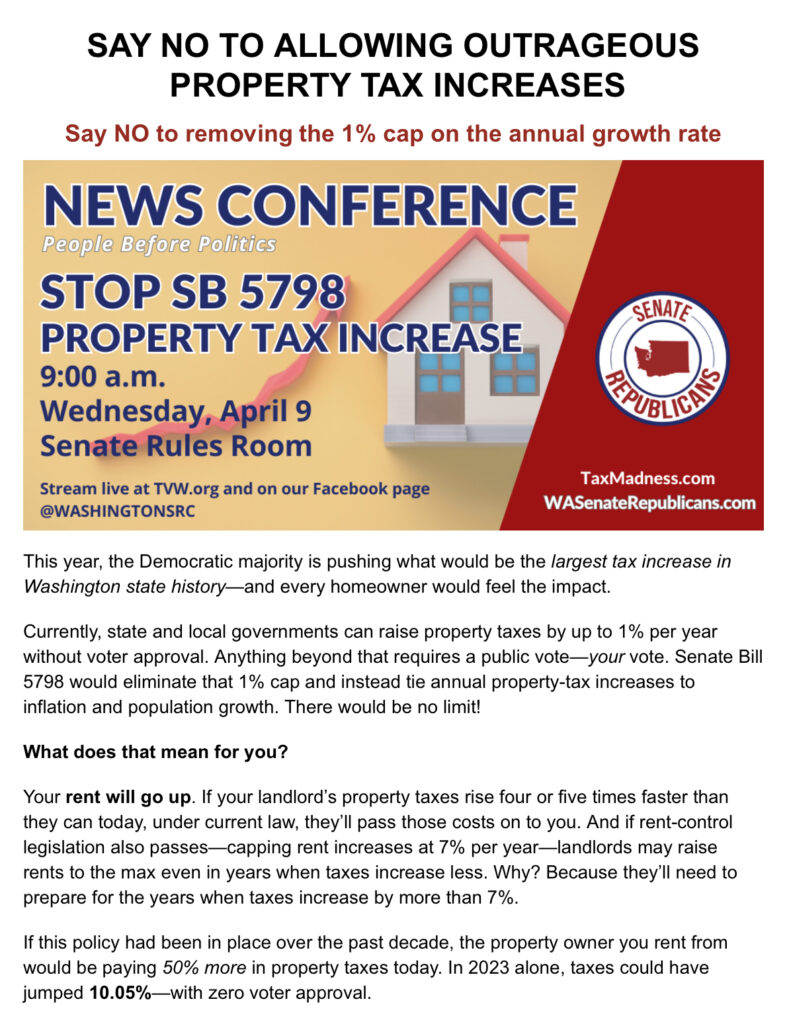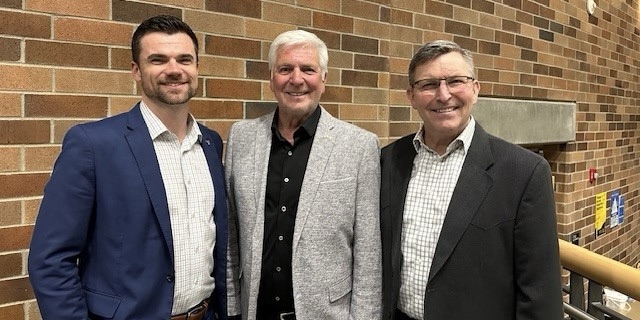Yesterday, an email from Washington Senate Republicans raised alarms about Senate Bill 5798, describing it as the largest tax increase in Washington state history and suggesting it would burden both homeowners and renters. While it’s crucial to consider the potential effects of any bill, it’s equally important to examine the facts. Let’s take a closer look at what SB 5798 actually proposes and why many of the claims in the email warrant further scrutiny.
What Does Senate Bill 5798 Do?
Senate Bill 5798 is a property tax reform measure that aims to adjust the way Washington state and local governments can collect revenue from property taxes. Currently, property tax revenue growth is capped at 1% per year without voter approval. Any increase beyond that requires a public vote. SB 5798 would change this system, adjusting the annual growth limit to be tied to inflation and population growth.
Here’s what the bill actually does:
Modifies the Property Tax Revenue Growth Limit: The 1% cap on property tax revenue growth is not being eliminated. Instead, it would be replaced with a more flexible limit that accounts for inflation and population growth. This means that property tax revenue could grow by a greater amount during years of economic expansion, but would still be subject to a cap based on these two factors. The limit would not be unlimited. Exemptions for Seniors and Other Qualified Property Owners: SB 5798 includes protections for seniors and other eligible property owners by exempting them from certain increases under the state’s property tax relief programs. This ensures that those on fixed incomes are not disproportionately affected by these changes. Allows for Infrastructure and Growth Investments: The bill provides flexibility for local governments to generate additional revenue for things like new construction, improvements to existing properties, or areas designated for special development. This ensures that growing communities can invest in necessary infrastructure to meet demand. Referendum Limitations: While SB 5798 prevents it from being overturned by a referendum, it is still possible for citizens to challenge the law through a citizen initiative. This is a common provision in many revenue-related laws, and while it limits one route for repeal, it does not remove public oversight entirely.
Dispelling the Misleading Claims in the Republican Email
The Republican email presents a range of claims designed to raise alarm. Let’s address some of the most significant concerns it raises:
- “This Bill Eliminates the 1% Cap—There Would Be No Limit!” Fact: This is misleading. SB 5798 does not eliminate the cap. Instead of the rigid 1% cap, the bill ties revenue growth to inflation and population growth, which creates a more dynamic, but still controlled, mechanism for raising property tax revenue. There will still be a cap, just a more flexible one that better reflects economic conditions.
- “Your Rent Will Go Up—Taxes Could Jump 10.05%” Fact: The possibility of a 10% tax increase is highly speculative and unlikely to occur every year. A tax increase of this size could only happen if inflation and population growth were both unusually high. Even then, it’s important to remember that property taxes are not directly tied to individual tax bills, and not all jurisdictions will raise taxes to the maximum allowed. Rent increases depend on a range of factors, not just property taxes.
- “Property Taxes Could Be 50% Higher Over the Last Decade” Fact: The claim that property taxes could have risen 50% over the past decade is based on a hypothetical scenario in which taxes were increased by the new maximum every year. However, in reality, many local governments don’t raise taxes to the full extent allowed, even under current law. SB 5798 allows for more revenue, but not every jurisdiction will choose to raise taxes to the maximum limit every year.
- “This Blocks the Public from Challenging It Via Referendum” Fact: It is true that SB 5798 cannot be overturned by referendum, but it is still possible for citizens to challenge the bill through a citizen initiative. This is a standard legal provision, and citizens retain the ability to make their voices heard through this process.
- “SB 5798 Would Allow $16 Billion in New Taxes Over the Next Decade” Fact: The $16 billion estimate comes from the Department of Revenue, projecting the potential total increase in property tax revenue if every jurisdiction used the new flexibility to its fullest extent. This is an estimate, not a guarantee, and it reflects the potential for increased revenue, not an automatic tax increase for every property owner.
Why This Reform Is Necessary
Senate Bill 5798 is not about imposing burdensome taxes on Washington’s families. It is about modernizing a property tax system that has not kept up with the state’s population growth and inflationary pressures. Over the last decade, many local governments have faced significant challenges in funding essential services like education, healthcare, and infrastructure. This bill provides local governments with the flexibility they need to meet these demands without constantly seeking voter approval for every tax increase.
For lower-income households, seniors, and others who are eligible for property tax relief programs, SB 5798 protects them from the worst impacts. The bill also gives communities the ability to raise funds for necessary investments, such as affordable housing and infrastructure projects, which are crucial for addressing the state’s current housing crisis.
While the Republican email may be effective at stirring fear, it’s important to separate fact from political rhetoric. Senate Bill 5798 is about giving local governments the tools they need to keep pace with inflation and population growth. It does not eliminate the 1% cap but adjusts it to reflect economic realities. By understanding the actual provisions of this bill, Washington residents can make an informed decision about its potential impact.
Rather than focusing on fear-based arguments, let’s focus on how SB 5798 can provide flexibility for local governments while still protecting vulnerable populations. The debate around this bill is an opportunity to reflect on how Washington funds its growth and supports its residents, ensuring that we have the resources we need to thrive.






